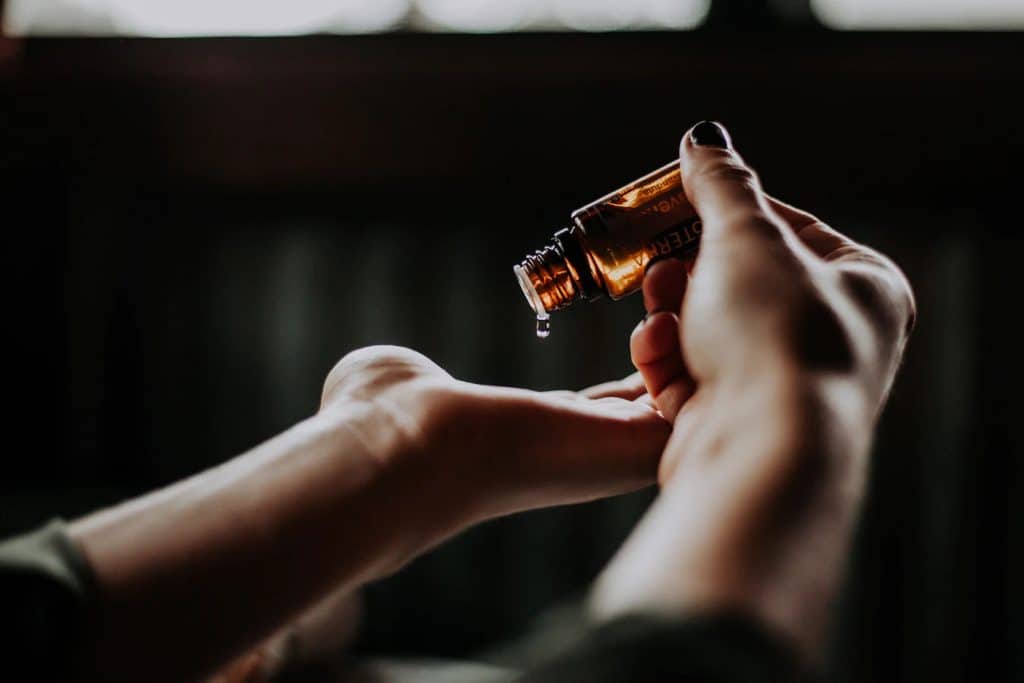If only I had a fiver for every time I’ve been asked
“Can I use Essential oil in the water”
No. You can’t.
And if you are reluctant to spend more hard-earned moolah on a bath oil, then I’ll ask one in return. . .
Have you ever made salad dressing?

When you make salad dressing, you add oil and a water based liquid like vinegar or lemon juice.
Or Bergamot juice, if you’re feeling flush and adventurous…
You add a few other things and then you shake it, shake it baby. (Twisting and shouting is optional, unless you have Gordon Ramsay there?)
You shake it, then leave it for a bit and come back and it has separated.
Because Oil and water don’t mix.
And, as you might have guessed from the name, Essential oils are oily
They are also incredibly intense and concentrated medicinal products. Some of them can even burn you.
Dropping essential oil on top of water, even if you use a portable liquidisery thingy will not mix the oil in the water; it will remain distinctly separate. And disparate.
An ‘oil in water’ emulsion will not spontaneously and magically occur. Chemistry and physics don’t work like that. Shame, and annoying, but so much is, I find.
To mix oil and water you need an emulsifier of some sort
This is because water molecules are polar.
This means that one end has a negative charge, and the other has a positive one. Just like a battery, except without the helpful little markings.
Those charges let the molecules form hydrogen bonds and attach to any other molecules that are polar, like other water molecules. So you get H2O.
Two lots of hydrogen to one lot of Oxygen. (Easy peasy. Who said chemistry was hard?)
But, oil molecules are not polar, so they can’t form hydrogen bonds. Even if they wanted to. Which they don’t seem to.
So, when you put oil and water together, the water molecules stick together like glue, and the oil molecules all squish up together in a distinctly separate clump. Like teenagers of opposite sexes at a disco.
What you see is two distinct layers. Floating oil on water
To get them to mix, or to make an emulsion, you need an emulsifier.
That’s alcohol, in the case of the shy teenagers, but to go back to our now-separated salad dressing, you can use something like mustard, mayonnaise or egg yolk. These will bind the two disparate substances together.
If you are absolutely insistent that you want to use your essential oil for your compresses, then you can try mixing it with full-fat milk. Which works a bit for some oils.
Too much faffing about for my liking, so I use a bath essence, which contains Sulphated castor oil (Organic, natch) which is an oil treated to mix with water. This is also known as Red Turkey oil, and is the only oil which will mix with water.
Using this means that your water is softened, scented and medicinally useful, as you can tailor the oil you choose for your compress to the time of day, your mood, and your current skin condition.
Sage is great for oilier skin, for calming down those pesky female hormones
Moor Lavender is fab at night, having soporific properties, is generally calming on both mood and skin redness, and softening the water for sensitive skin
Lemon is good for summer time, as it’s cooling, but also lovely and awakening of a dull dreary morning, when you’d really rather not bother
Rose is the queen of Flowers, smells divine, and is suitable at all and any times. A bit like champagne. . .
But don’t put champagne in your compress water. That would be wasteful.
So the short answer to “can I use essential oils instead, because I’ve got those and it’s cheaper?”
It’s still no.
Not because essential oils aren’t wonderful – they are – but because it’s wasteful.

